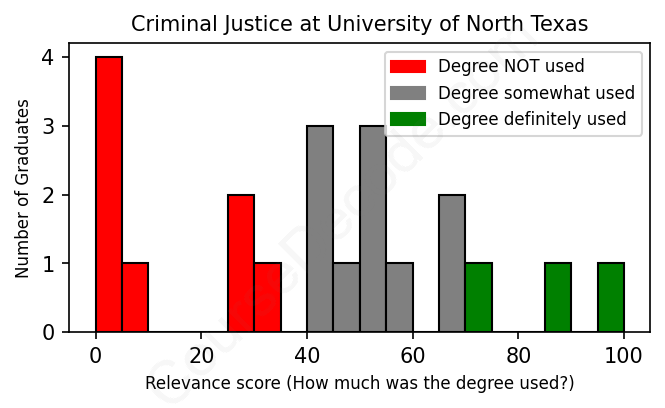
First, some facts. Of the Criminal Justice graduates from University of North Texas we've analyzed , here's how many have used (or NOT used) their degree in their career:

These are estimates based on AI analysis of 21 LinkedIn profiles (see below).
The verdict? Bad. Overall, with an average relevance score of 41%, Criminal Justice graduates from University of North Texas have a substantially lower likelihood (-26%) of finding work in this field compared to the average graduate across all fields:
And for comparison, here's the chart for all profiles we've looked at across all degrees.
Also, after graduating, only 23% of these graduates have pursued further education other than another Bachelor's degree (such as a Masters degree or other), compared to the average across all profiles of 35%. This suggests a Bachelors degree is enough for most Criminal Justice graduates, and it's normal to look for work straight after graduation.
See the details:
|
Relevance score: 50% We think this person has gone into a career only somewhat relevant to their degree. We think this person has gone into a career only somewhat relevant to their degree.
DEGREE INFOGraduated in 2011 from University of North Texas with a Bachelors in Criminal Justice. No other secondary education since. JOB HISTORY SINCE GRADUATIONCompliance Coordinator Intrepid USA Healthcare Services Mar 2012 - Oct 2015 ABOUTNo information provided. |
The top 10 most common jobs done by the graduates we've analyzed (ranked most common to least) are:
When looking at the job profiles of those who graduated with a degree in Criminal Justice from the University of North Texas, you can see a pretty mixed bag of career paths. Many graduates found themselves in fields that, while they might have some tangential connection to criminal justice, don't directly apply the skills or knowledge they learned in school. For instance, jobs in hospitality, banking, sales, and even education have been quite common, but these roles generally focus more on customer service or management rather than criminal justice principles. Some individuals did take on positions in law enforcement or community service roles, where they could apply their degrees more directly, such as parole officers, counseling interns, or even legal assistants. However, these positions seem to be outnumbered by those working in fields that don’t have a strong relevance to their studies.
At the end of the day, while you’ll definitely find graduates who found roles directly related to criminal justice—like community supervision officers, police interns, and paralegals—a significant portion of this group's jobs don't engage with the core aspects of the criminal justice system. It raises an interesting question about the job market for criminal justice majors and whether they’re fully utilizing their education in their career choices. So, while there are some pathways leading back to criminal justice, many graduates end up in roles that focus on other skills entirely. That said, it's essential to remain open-minded about how your degree can lead you in various directions, even if those don’t seem directly related at first glance!
Here is a visual representation of the most common words in job titles for Criminal Justice graduates (this is across all Criminal Justice graduates we've analyzed, not just those who went to University of North Texas):

Looking at the career trajectories of graduates from the University of North Texas with a degree in Criminal Justice, it's clear that there’s a mix of outcomes. Many of the early jobs these graduates land right after college tend to be in related fields, such as compliance coordination, community supervision, or even roles within law enforcement agencies. For example, some have started off as community supervision officers or parole officers, which are direct extensions of their studies. However, there are also a fair number of graduates who seem to drift into roles that don't closely align with criminal justice, such as banking or administrative positions. This indicates that, while some are finding relevant positions fairly quickly, others might be struggling to connect their degree to their first jobs.
Fast forward five to ten years, and the picture is a bit mixed. Graduates who started in criminal justice-related roles, like community coordinators or compliance positions, often have climbed the ladder within those fields. However, many others have veered off into different paths altogether. Some transitioned completely away from criminal justice, entrenching themselves in industries like finance and education. It’s worth noting there are also individuals who have made impressive moves, becoming consultants or taking on significant roles in academia. While there are definitely success stories amongst these grads, there’s also a noticeable trend of either career deviations or lateral moves into unrelated sectors, which could reflect a broader trend of underemployment or career exploration post-graduation. Overall, it seems that if you're set on a career in criminal justice, some of these paths can certainly lead there, but there are also plenty of instances where the degree doesn't directly translate to a fulfilling career in the field.
Honestly, a Bachelor's degree in Criminal Justice can vary in difficulty depending on your interests and strengths. At the University of North Texas, it's generally considered to be on the more manageable side compared to some other majors, especially if you enjoy the subject matter. You'll cover topics like criminal law, policing, and the justice system, which can be pretty interesting if you're into that sort of thing. That said, there will definitely be some heavy reading and writing, so if you're not a fan of that, it might feel a bit tougher. Overall, it’s not typically regarded as one of the hardest degrees out there, but like any college program, it requires dedication and effort to keep up with the workload.
Most commonly, in the LinkedIn profiles we've looked at, it takes people 4 years to finish a Bachelor degree in Criminal Justice.
Looking at the job paths of these Criminal Justice grads from the University of North Texas, it seems there's a bit of a mixed bag when it comes to how much money they're making. Some of them, especially the ones who moved into roles like construction management or high-level positions in law enforcement or consulting, likely pulled in decent salaries as they climbed the ladder. On the other hand, many entry-level roles in customer service or internships probably didn’t pay that great. Overall, it looks like some folks are doing pretty well, while others might still be working their way up to more lucrative positions. It just goes to show that who you meet and the experience you gain can really impact your earning potential in this field!
Here is a visual representation of the most common words seen in the "about" section of LinkedIn profiles who have a Bachelor degree in Criminal Justice (this is across all Criminal Justice graduates we've analyzed, not just those who went to University of North Texas). This may or may not be useful:

Here are all colleges offering a Bachelor degree in Criminal Justice (ordered by the average relevance score of their Criminal Justice graduates, best to worst) where we have analyzed at least 10 of their graduates: